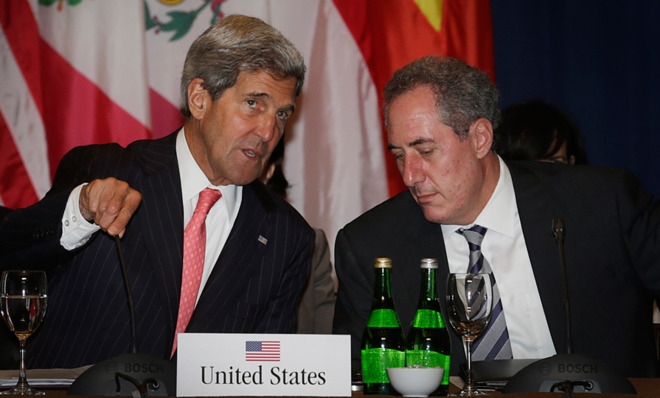What's the best way find about the U.S.'s huge, new, super-secret trade deal? Your local paper.
Scant details have emerged about the Trans Pacific Partnership. But scattered clues have cropped up in small-time rags across the country.


A free daily email with the biggest news stories of the day – and the best features from TheWeek.com
You are now subscribed
Your newsletter sign-up was successful
Next month, talks resume in the negotiation of the Trans-Pacific Partnership, a trade treaty being hammered out between 12 Pacific Rim nations, which promises the greatest revision of American trade laws since NAFTA.
Despite the substantial impact the TPP will undoubtedly have on American communities large and small, there has been relatively little commentary about it in the national press. However, interesting hints about the ongoing talks can be found — if you’re willing to scrounge in local news sources.
The relative quiet is partly due to the secrecy of the talks themselves — secretive enough that Wikileaks has occasionally involved itself in publicizing new drafts of the TPP negotiations. Congress has granted fast-track authority to the potential agreement, meaning that when the TPP is finalized, Congress will give it an up-and-down vote with no amendment process.
The Week
Escape your echo chamber. Get the facts behind the news, plus analysis from multiple perspectives.

Sign up for The Week's Free Newsletters
From our morning news briefing to a weekly Good News Newsletter, get the best of The Week delivered directly to your inbox.
From our morning news briefing to a weekly Good News Newsletter, get the best of The Week delivered directly to your inbox.
After years of sensitive multilateral talks, any congressional meddling would torpedo the agreement. At the same time, our elected officials do lobby U.S. trade negotiators, who want to design the agreement so that it won’t receive an embarrassing rebuke from Congress.
We do know in general terms that the talks involve not just the lowering of tariffs, but environmental laws, intellectual property rights, regulatory regimes, and currency manipulation. There are also some unstated geopolitical goals involved in the TPP, namely finding a way to box in and tame China.
But on any one line of a drafted trade agreement, entire industries may rise or fall. In some states, a few closed factories can generate enough outrage to derail a political career. And so it makes sense that our best insights into the TPP have come from local press outlets, which are closer to the industries and politicians that have narrow, tangible interests in an otherwise sprawling deal.
In Wisconsin, for example, legislators are lobbying TPP negotiators to press for opening up Canada to the U.S. dairy industry.
A free daily email with the biggest news stories of the day – and the best features from TheWeek.com
In Maine, senators have begged trade negotiators to tour New Balance’s shoe factories in the interior of their state, which could be adversely affected by a lowering of trade barriers. (New Balance still makes 25 percent of its athletic shoes domestically.) But other companies with a labor force in New England — including Adidas, Saucony, and Nike — have joined together to lobby the other side of the debate. They argue that by lowering tariffs on Vietnamese-made shoes, rising profits will enable them to hire more high-end workers in design and advertising in their American headquarters.
Meanwhile, Maine’s loberstermen and blueberry farmers would like to see tariffs go down to expand the reach of their frozen food products.
In Michigan, automakers want assurances that Japan won’t manipulate its currency to keep out American autos. Michigan pols have suggested that tariffs on Japanese manufactured cars be phased out over the longest possible time in the agreement. United Auto Workers President Bob King is also trying to protect American industries from cheaper Japanese cars.
At the national level, interest in the TPP is defined in abstract ideological terms, and so it has had little purchase. (Last year, for example, an editorial in The Nation called the TPP a "corporate coup.") Populists on the left and right fear trade agreements like these for a variety of overlapping reasons. The left fears a corporate takeover of the political sphere, the right fears the erosion of national sovereignty. Both fear the disappearance or weakening of certain national industries.
At the same time, there is a broad consensus among elite policymakers that trade liberalization will mean increased prosperity at home and abroad, even if there is some "creative destruction" along the way.
Although policymakers hope that the TPP will be hammered out in the first half of 2014, it seems just as likely that the agreement will need several more rounds stretching into next year before it is finished and made public. In the meantime, the place to find the most relevant news and hints about what the TPP might entail might just be your local paper.
Michael Brendan Dougherty is senior correspondent at TheWeek.com. He is the founder and editor of The Slurve, a newsletter about baseball. His work has appeared in The New York Times Magazine, ESPN Magazine, Slate and The American Conservative.
-
 The 8 best TV shows of the 1960s
The 8 best TV shows of the 1960sThe standout shows of this decade take viewers from outer space to the Wild West
-
 Microdramas are booming
Microdramas are boomingUnder the radar Scroll to watch a whole movie
-
 The Olympic timekeepers keeping the Games on track
The Olympic timekeepers keeping the Games on trackUnder the Radar Swiss watchmaking giant Omega has been at the finish line of every Olympic Games for nearly 100 years
